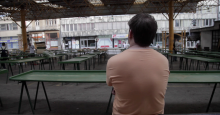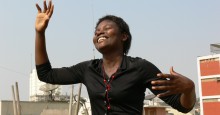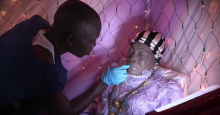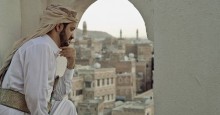“The World View grant was critical to the completion of this film. Without it, there would never have been a War Child.”
Children of Gaza was commissioned by C4 and funded by the C4, C4i and True Vision Productions.
In early 2009 Jezza Neumann arrived in Gaza. He and his AP Khalid set about meeting NGO’s and local organisations. Through these organisations they were introduced to families across the Gaza Strip. After talking to over 35 children they started to film. Amal, Mahmoud, Ibraheem and Omsyatte were four children who were extremely articulate and whose lives were changed forever through the tragedy of war.
The film was shot on a Sony Z5, and recorded on 1080 HD 25p flashcards and at times on a Sony Z1 on DV. Gaza is built on sand and much of it is now rubble so dust was a real problem when filming. Filmed though the summer meant operating in over 40 degrees which really tested the camera especially the flash card recording unit.
Omsyatte’s family came to Gaza as refugees in 1948 when her grandfather started life in a tent in Raffa. Now 62 yrs later she is living in a tent after her brother was killed and her house destroyed in the war.
Like many in Gaza the family receives some food aid and water is provided by NGO’s. Tent life is a struggle compared to their life before the war. The tents are on sand, which is constantly blown everywhere making it impossible to keep the tents clean. With constant power cuts throughout the Gaza strip Omsyatte finds it very difficult to do her homework at night so struggles with her studies.
Amal and Mahmoud currently live in a hut made from breeze blocks reclaimed form the destroyed houses on their area. They don’t have a proper kitchen or bathroom and the hut only has one room in which they eat, rest and sleep. According to Amal and Mahmoud their father was shot when the Israeli soldiers called out for the owner of the house. Their 4 yr old brother was shot whilst in his mother’s arms.
Amal was separated from the rest of her family and ended up in a house which was later shelled leaving her with shrapnel in her brain.
Amal now suffers from headaches and also from pain when the shrapnel seems to move in her head. Amal suffers at school as she finds it difficult to concentrate in class and can’t mix much with the other kids in break times.
She misses her father who used to spoil her, as she was his only daughter. Her sister was then born 10 days before her father was killed.
Mahmoud has been unable to come to terms with the loss of his father and struggles with the knowledge that nothing has happened to those who killed him. He wants revenge for his father’s death and sees violence as the only way to achieve that in the current political environment.
Mahmoud is the eldest of the children and so has almost become a father figure to his youngest siblings. Whenever his mother has to go to market or visit a relative he is left in charge of all the children.
As their father died in the war they don’t have to pay school fees however he left many debts so the family now struggle to buy food and pay for the transportation to get to school. With little hope of Amal’s mother ever finding work the children’s future looks bleak.
For Ibraheem, the son of a fisherman the war isn’t over, as Israeli gunboats continue to patrol the sea. The Oslo peace Accord stated that fisherman should be allowed to sail up to 20 nautical miles from the Gaza shore. The Israeli navy restrict the fisherman to just 3. Whenever he can Ibraheem works with his uncle’s on the boat and has experienced first hand attacks by the Israeli navy. Whenever the boats are damaged there is a huge financial loss to the family as spare parts are extremely hard to come by.
Ibraheem and his friends spend their spare time acting out the stories they hear from their uncles and experienced during the war.
Ibraheem longs to go to college and travel overseas but doesn’t see this happening unless somehow the blockade is lifted and the seas opened.
Since filming finished we have remained in touch with the children through Khalid who calls and visits them on a regular basis.
Press
“Children Of Gaza: An unflinching portrait of conflict’s aftermath” Metro
“It’s brilliantly done, stark and beautifully shot.” Sam Wollaston, The Guardian
“Intensely shocking sequel to last year’s Children of Gaza… Filmed with admirable understatement by Jezza Neumann.” Jane Shilling, Evening Standard
“**** Excellent” Gabriel Tate, Time Out
Awards
Children’s Rights Award – One World Media Awards
Silver Hugo – Chicago Film Festival



